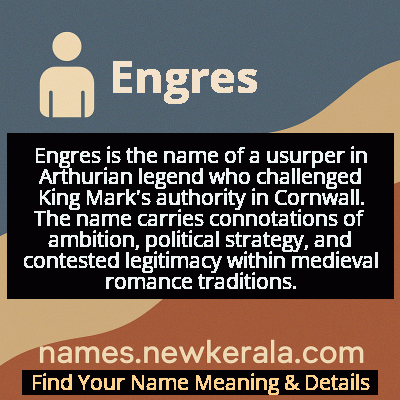Engres Name Meaning & Details
Origin, Popularity, Numerology Analysis & Name Meaning of Engres
Discover the origin, meaning, and cultural significance of the name ENGRES. Delve into its historical roots and explore the lasting impact it has had on communities and traditions.
Name
Engres
Gender
Male
Origin
Arthurian
Lucky Number
5
Meaning of the Name - Engres
Engres is the name of a usurper in Arthurian legend who challenged King Mark's authority in Cornwall. The name carries connotations of ambition, political strategy, and contested legitimacy within medieval romance traditions.
Engres - Complete Numerology Analysis
Your Numerology Number
Based on Pythagorean Numerology System
Ruling Planet
Mercury
Positive Nature
Adventurous, dynamic, curious, and social.
Negative Traits
Restless, impatient, inconsistent, prone to indulgence.
Lucky Colours
Green, white.
Lucky Days
Wednesday.
Lucky Stones
Emerald.
Harmony Numbers
1, 3, 9.
Best Suited Professions
Sales, marketing, travel, entertainment.
What People Like About You
Versatility, charisma, adventurous spirit.
Famous People Named Engres
Engres the Usurper
Arthurian Knight
Attempted to seize the throne of Cornwall from King Mark
Sir Engres of Wales
Knight of the Round Table
Known for his military prowess but ultimately exiled for treasonous ambitions
Engres de Cornwall
Nobleman
Featured in Tristan and Iseult legends as a rival claimant to regional power
Name Variations & International Equivalents
Click on blue names to explore their detailed meanings. Gray names with will be available soon.
Cultural & Historical Significance
The cultural significance of Engres extends beyond his specific narrative role to represent a broader archetype of the ambitious noble who believes their capabilities justify seizing power. In the moral universe of Arthurian legend, where the ideals of chivalry and proper governance are paramount, characters like Engres provide necessary contrast to virtuous rulers. His story warns against the dangers of unchecked ambition while simultaneously acknowledging the complex motivations that drive political challengers. This dual perspective makes Engres a more nuanced figure than a simple villain, reflecting medieval literature's capacity for psychological complexity even in secondary characters.
Extended Personality Analysis
Those associated with the name Engres typically exhibit a complex blend of strategic intelligence, relentless ambition, and charismatic leadership that can inspire both loyalty and fear. They possess a natural understanding of power dynamics and are often gifted at identifying weaknesses in existing systems, which they exploit with careful planning and patience. This analytical approach to leadership is complemented by a strong will and determination that enables them to pursue long-term goals despite obstacles or opposition. Their ambition is rarely impulsive but rather calculated, built on careful observation and strategic positioning within social and political networks.
However, the Engres personality also carries significant moral complexity, often wrestling with questions of legitimacy and the ethical boundaries of ambition. While capable of great vision and organizational skill, they may struggle with trust issues and a tendency toward manipulation when pursuing their objectives. Their strength lies in their ability to challenge stagnant systems and implement change, but this same quality can manifest as destructive when not tempered by ethical considerations. The psychological profile suggests individuals who are both admired for their capability and feared for their willingness to overturn conventions, creating a perpetual tension between their innovative potential and the disruption they inevitably cause.
Modern Usage & Popularity
In contemporary contexts, the name Engres remains predominantly confined to literary and academic circles, with virtually no usage as a given name in modern populations. Its strong association with usurpation and political ambition in Arthurian legend makes it an unlikely choice for parents, though it occasionally appears in historical fiction, fantasy literature, and role-playing games where its dramatic connotations are desirable. The name has never registered in official birth records or name popularity databases, maintaining its status as a specialist reference rather than a living anthroponym. However, it continues to be studied by Arthurian scholars and occasionally inspires character names in media exploring themes of political intrigue and challenged authority, serving as a symbolic shorthand for ambitious challengers to established power structures.
Symbolic & Spiritual Meanings
Symbolically, Engres represents the eternal challenge to established authority and the complex relationship between ambition and legitimacy. The name embodies the archetype of the strategic usurper—not merely a rebel or revolutionary, but a calculated challenger who understands systems of power well enough to manipulate them for personal gain. This symbolism extends to broader themes of political transition, the morality of ambition, and the philosophical question of whether effectiveness in leadership can justify unconventional paths to power. The name also carries connotations of isolation and the psychological weight borne by those who dare to challenge conventional hierarchies, suggesting that the pursuit of power often comes at the cost of traditional social bonds and moral certainty.

